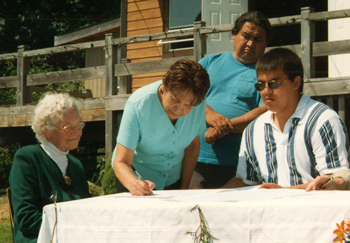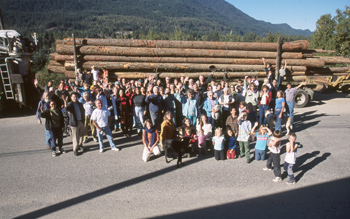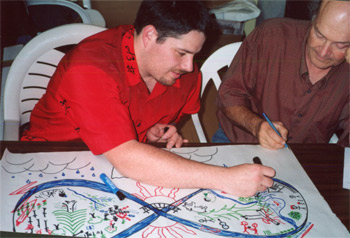|

Elders from the Klahoose First Nation and Cortes Island community sign historic Memorandum of Understanding to work together on ecosystem-based approaches.

The community of Harrop-Procter celebrates the first load of logs from the community forest.
Importance of Communities
People in First Nations and other rural communities are those most directly affected by resource extraction activities, yet often they have the least say in the decisions that are made. By developing their own information that reflects ecosystem-based principles and their unique vision, communities across Canada are taking control of what happens on the lands that surround and sustain them.
Since 1993, the Silva Forest Foundation has been working with communities in many parts of Canada to develop and implement ecosystem-based conservation plans that will protect and/or restore the integrity of ecosystems, protect cultural activities, maintain strong communities, and develop diverse, community-based economies. Twelve communities have completed ecosystem-based conservation plans with Silva.
While Silva can provide the technical and professional expertise to develop ecosystem-based plans, we rely on the First Nations and rural communities we work with to define and implement strategies for effectively using the information.
Silva encourages full participation of First Nations and local communities throughout the ecosystem-based planning process. Respect for and accommodation of First Nations aboriginal title and rights is a major factor in designing and implementing an ecosystem-based planning process. Learning from Indigenous Elders and other Indigenous experts, we incorporate Indigenous knowledge into the development of EBCPs. At the request of First Nations, Silva will work with the First Nation to integrate cultural reserves and ecological reserves to develop a cultural and ecosystem-based plan.
Local knowledge from all members of communities that we work with is respectfully and carefully incorporated into ecosystem-based conservation plans.
Community interests that participate with Silva in an ecosystem-based planning process need to have a significant constituency, a clear means of regularly communicating with their constituency, and a clear means of being held accountable to their constituency and to the broader community. All participating interests, need to be comfortable with the philosophy and principles of an ecosystem-based approach to planning.
The mapping and information resulting from ecosystem-based conservation planning can be used in many ways, depending on the goals of each community. Across Canada, communities are using ecosystem-based planning to:
- Establish large, landscape-level protected areas, and ecological “core reserves,’ and broad “linkages” or connecting corridors
- Establish “watershed level ecological reserves and linkages
- Obtain and operate a community forest agreement tenure
- Negotiate accommodation of aboriginal title and rights
- Support legal actions related to aboriginal title and rights
- Protect traditional and contemporary cultural uses of the land
- Combine traditional use information with ecological information
- Participate effectively in land use planning processes
- Create bylaws regulating activities on private forest land
- Revise Official Community Plans
- Educate the public, government, and industry
- Evaluate industry plans
- Pressure timber and mining companies to adopt ecosystem-based approaches
- Provide the cornerstone of long-term planning for the protection and use of the land and water
- Design ecosystem-based logging operations in woodlots and community forests
- Protect water quality, quantity, and timing of flow
- Protect wildlife habitat
- Develop diversified, short-term and long-term economic opportunities
- Bring together people with diverse viewpoints
- Train people in the community to implement the ecosystem-based plan
- Build relationships between aboriginal and non-aboriginal people in the community
- Include all voices in the community in the planning process
 Appreciative Inquiry Appreciative Inquiry
Community members envisioning the future using Appreciative Inquiry
People in communities (or groups of any kind) often find themselves bogged down in trying to solve all of the problems they face. Sometimes the harder they try, the more difficult the task becomes. In order to successfully develop and implement ecosystem-based conservation planning, communities need to develop a common vision and implement a set of positive actions to reach their vision.
Silva uses Appreciative Inquiry (Ai) with communities. Ai is a way of working with change in any human group by asking questions about what works and designing a future that draws on the strengths uncovered.
The simple principles behind Ai are that in every group something works (if nothing at all were working, the group would not exist) and that no problem happens all the time. The group moves forward by identifying the factors that contribute to their success, rather than studying the reasons for their problems and their failures.
The axiom is that what we look for, we get more of. Thus, if we look for what is wrong, we are likely to get more of what goes wrong. If we look for what goes well, we are likely to get more of what goes well.
Appreciative inquiry does not ignore problems. However, participants in an Ai process are asked to describe what the situation would look like if the problem did not exist and then to design ways to get to that desired situation. Ai cannot guarantee a path to the future that is free of obstacles, but it can consolidate and sustain the vision and energy of the members of a group so that they face their future from a position of strength, confidence, self-knowledge, self-respect, and hope. Learn more about Appreciative Inquiry, read our article, An Introduction to Appreciative Inquiry.
|

